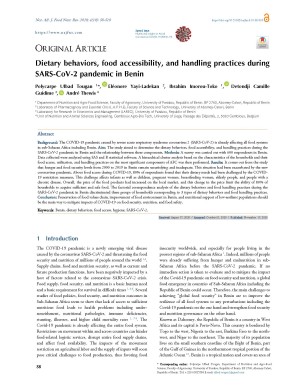Dietary behaviors, food accessibility, and handling practices during SARS-CoV-2 pandemic in Benin
Abstract
Background: The COVID-19 pandemic caused by severe acute respiratory syndrome coronavirus 2 (SARS-CoV-2) is already affecting all food systems in sub-Saharan Africa including Benin. Aim: The study aimed to determine the dietary behaviors, food accessibility, and handling practices during the SARS-CoV-2 pandemic in Benin and the relationship between these components. Methods: A survey was carried out with 600 respondents in Benin. Data collected were analyzed using SAS and R statistical software. A hierarchical cluster analysis based on the characteristics of the households and their food access, utilization, and handling practices on the most significant components of AFC was then performed. Results: It comes out from the study that hunger and food security levels from 2000 to 2019 in Benin remain unsatisfying and inadequate. This situation had been exacerbated by the new coronavirus pandemic. About food access during COVID-19, 80% of respondents found that their dietary needs had been challenged by the COVID-19 restriction measures. This challenge affects infants as well as children, pregnant women, breastfeeding women, elderly people, and people with a chronic disease. Overall, the price of the food products had increased on the local market, and this change in the price limit the ability of 80% of households to acquire sufficient and safe food. The factorial correspondence analysis of the dietary behaviors and food handling practices during the SARS-CoV-2 pandemic in Benin discriminated three groups of households corresponding to 3 types of dietary behaviors and food handling practices. Conclusion: Preservation of food values chain, improvement of food environment in Benin, and nutritional support of low-resilient populations should be the main way to mitigate impacts of COVID-19 on food security, nutrition, and food safety.
Full text article
Authors
Copyright (c) 2020 Authors

This work is licensed under a Creative Commons Attribution 4.0 International License.
-
Attribution — You must give appropriate credit, provide a link to the license, and indicate if changes were made. You may do so in any reasonable manner, but not in any way that suggests the licensor endorses you or your use.
-
No additional restrictions — You may not apply legal terms or technological measures that legally restrict others from doing anything the license permits.





